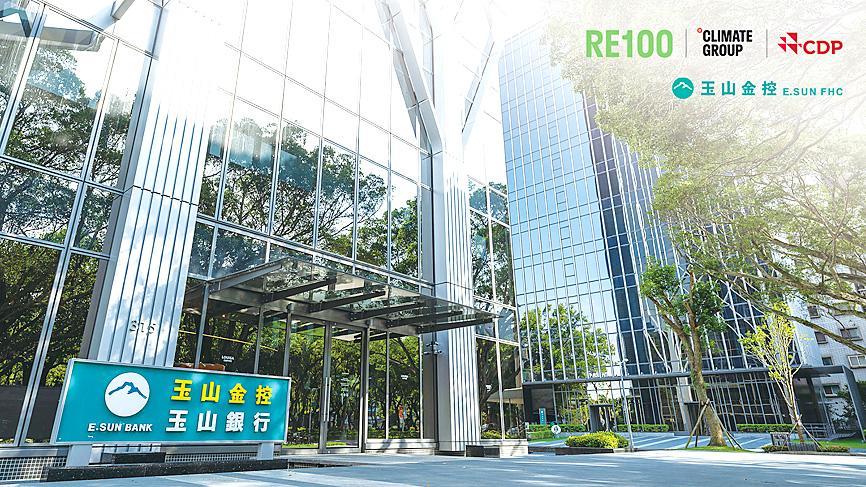E.Sun Financial Holding Co (玉山金控), one of Asia’s leading financial services organizations, based in Taipei, has joined the RE100 initiative and committed to using 100 percent renewable electricity across its global operations by 2040, the company said on Tuesday.
“We are delighted to welcome E.Sun to RE100. By committing to 100 percent renewable electricity by 2040, E.Sun joins over 300 of the world’s leading businesses committed to driving market change. This sends a powerful message that renewable electricity makes good business sense, and we encourage others to follow,” said Sam Kimmins, head of RE100 at The Climate Group.
To accelerate change toward zero-carbon electricity through the power of finance and investment, RE100 set further criteria within financial sectors, including management of its financed emissions impacts, phasing out financing of coal-powered energy and thermal coal mining, and limiting significant investments in fossil fuels projects.

Photo courtesy of E.Sun Financial Holding Co
RE100 has recognized the need for the financial sector to contribute effectively to the energy transition and to thrive in a future in which carbon emissions are restrained.
“It has been the responsibility and mission of E.Sun to protect this beautiful land since it was founded. Before being approved to become a member of RE100, E.Sun dedicated years of effort to environmental sustainability, including becoming the largest buyer of renewable energy, completing an inventory of carbon emissions from the most crucial investment and loan positions of financial institutions, gradually changing policies and processes for investment and lending, and becoming the first financial institution in Taiwan and second in Asia to pass the review of the Science Based Targets Initiative,” E.Sun Financial president and chief sustainability officer Magi Chen (陳美滿) said.
“E.Sun was the first to commit to phasing out coal-related industries by 2035, and we actively exerted our financial influence by leading the industry in adopting numerous international standards and initiatives. Joining RE100 is an important milestone for E.Sun toward net-zero emissions. In the future, we will continue to guide the net-zero transition of energy systems through financial resources and achieve the world’s common climate goals,” Chen said.
Deeply aware that Taiwanese enterprises are important members of global supply chains, E.Sun extends its influence in sustainability issues through its financial business when facing pressures and challenges to achieve net-zero emissions, it said.
This includes supporting the development of the renewable energy industry through project financing, such as solar power stations, offshore wind farms, onshore wind farms and geothermal energy, the company said.
E.Sun is also the largest issuer of green bonds in Taiwan, it said.
Financial institutions are channeling resources into environmental sustainability and carbon reduction transition projects in the hopes of accelerating the development of renewable energy in Taiwan through the participation of a greater number of enterprises, it said.
E.Sun believes that action brings change, and cooperation allows capabilities to be combined with others to jointly work toward a beautiful homeland with net-zero emissions, it said.

NEW IDENTITY: Known for its software, India has expanded into hardware, with its semiconductor industry growing from US$38bn in 2023 to US$45bn to US$50bn India on Saturday inaugurated its first semiconductor assembly and test facility, a milestone in the government’s push to reduce dependence on foreign chipmakers and stake a claim in a sector dominated by China. Indian Prime Minister Narendra Modi opened US firm Micron Technology Inc’s semiconductor assembly, test and packaging unit in his home state of Gujarat, hailing the “dawn of a new era” for India’s technology ambitions. “When young Indians look back in the future, they will see this decade as the turning point in our tech future,” Modi told the event, which was broadcast on his YouTube channel. The plant would convert

‘SEISMIC SHIFT’: The researcher forecast there would be about 1.1 billion mobile shipments this year, down from 1.26 billion the prior year and erasing years of gains The global smartphone market is expected to contract 12.9 percent this year due to the unprecedented memorychip shortage, marking “a crisis like no other,” researcher International Data Corp (IDC) said. The new forecast, a dramatic revision down from earlier estimates, gives the latest accounting of the ongoing memory crunch that is affecting every corner of the electronics industry. The demand for advanced memory to power artificial intelligence (AI) tasks has drained global supply until well into next year and jeopardizes the business model of many smartphone makers. IDC forecast about 1.1 billion mobile shipments this year, down from 1.26 billion the prior

People stand in a Pokemon store in Tokyo on Thursday. One of the world highest-grossing franchises is celebrated its 30th anniversary yesterday.

Zimbabwe’s ban on raw lithium exports is forcing Chinese miners to rethink their strategy, speeding up plans to process the metal locally instead of shipping it to China’s vast rechargeable battery industry. The country is Africa’s largest lithium producer and has one of the world’s largest reserves, according to the US Geological Survey (USGS). Zimbabwe already banned the export of lithium ore in 2022 and last year announced it would halt exports of lithium concentrates from January next year. However, on Wednesday it imposed the ban with immediate effect, leaving unclear what the lithium mining sector would do in the